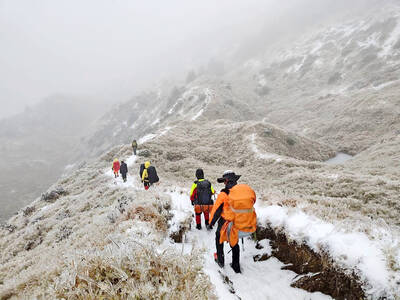A sex worker advocacy group on Tuesday called on the public to stop discriminating against workers at tea houses in Taipei’s Wanhua District (萬華).
A kind of tea house common in the district, called “A-gong Diam” (阿公店) in Hoklo (commonly known as Taiwanese), has deep roots in Wanhua, where they offer much-needed social interactions to older residents, the Collective of Sex Workers and Supporters said.
The tea houses’ reputation has taken a hit amid an outbreak of local COVID-19 infections since last week that health authorities have traced back to establishments in Wanhua.
The tea houses are important to the district’s local economy and culture, and services offered there are not exclusively related to sex, the group said.
DIVERSE OFFERINGS
While some of them offer such services, their main role is offering opportunities for social interaction for older residents, it said.
The tea houses offer a social space for elderly people that can be compared to KTVs for younger people, the group said, adding that not just older residents find emotional and social support there, but the businesses also help disadvantaged women, especially single mothers, have an income.
People should consider the social role of the tea houses, the group said, calling on the public not to discriminate against those who visit the establishments or work there.
All tea houses in Wanhua have suspended operations after the outbreak, it said, adding that slander against the establishments would not help improve the pandemic situation.

Trips for more than 100,000 international and domestic air travelers could be disrupted as China launches a military exercise around Taiwan today, Taiwan’s Civil Aviation Administration (CAA) said yesterday. The exercise could affect nearly 900 flights scheduled to enter the Taipei Flight Information Region (FIR) during the exercise window, it added. A notice issued by the Chinese Civil Aviation Administration showed there would be seven temporary zones around the Taiwan Strait which would be used for live-fire exercises, lasting from 8am to 6pm today. All aircraft are prohibited from entering during exercise, it says. Taipei FIR has 14 international air routes and

The Ministry of National Defense (MND) today released images of the military tracking China’s People's Liberation Army (PLA) movements during the latest round of Chinese drills around Taiwan. The PLA began "Justice Mission 2025" drills today, carrying out live-fire drills, simulated strikes on land and maritime targets, and exercises to blockade the nation's main ports. The exercises are to continue tomorrow, with the PLA announcing sea and air space restrictions for five zones around Taiwan for 10 hours starting from 8:30am. The ministry today released images showing a Chinese J-16 fighter jet tracked by a F-16V Block 20 jet and the

Snow fell on Yushan (Jade Mountain, 玉山) yesterday morning as a continental cold air mass sent temperatures below freezing on Taiwan’s tallest peak, the Central Weather Administration (CWA) said. Snowflakes were seen on Yushan’s north peak from 6:28am to 6:38am, but they did not fully cover the ground and no accumulation was recorded, the CWA said. As of 7:42am, the lowest temperature recorded across Taiwan was minus-5.5°C at Yushan’s Fengkou observatory and minus-4.7°C at the Yushan observatory, CWA data showed. On Hehuanshan (合歡山) in Nantou County, a low of 1.3°C was recorded at 6:39pm, when ice pellets fell at Songsyue Lodge (松雪樓), a

NO SHAME IN RETREAT: Hikers should consider turning back if the weather turns bad or if they do not have sufficient equipment, the Taroko park headquarters said Two people died of hypothermia over the weekend while hiking on Hsuehshan (雪山), prompting park authorities to remind hikers to bring proper equipment and consider their physical condition before setting out in the cold weather. Temperatures dropped over the weekend, bringing snow to high altitudes in Shei-pa National Park. One hiker, surnamed Lin (林), who on Friday was traveling with a group of six along the Hsuehshan west ridge trail, lost consciousness due to hypothermia and died, the Shei-pa National Park Headquarters said. On Saturday, another hiker, surnamed Tien (田), in a group of five on the southeast of the west